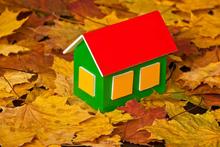
Check around the furnace before turning on the heat for the first time. Make sure there’s nothing near it that’s flammable. It’s also a good idea to have your furnace inspected before winter sets in. (If for some reason you can’t, take a look at it yourself. Make sure the flame is blue, not yellow or orange. Check the pipe from the furnace to the chimney to be sure it doesn’t have rust spots and isn’t disconnected at either end.) If you have radiators, remove anything that’s sitting on top of them before the heat comes on.
Dress kids in light-colored clothing to help drivers see them on their way home from after-school activities. On Halloween, make sure your kids can be seen. Give them a flashlight and glowstick, and if their costume is dark, add some reflective stickers or tape.
Change batteries when you “fall back.” Smoke alarms most often fail to sound an alarm because of missing, dead or disconnected batteries. Replace the batteries twice a year when you change the clocks (or whenever the alarm “chirps,” indicating the battery is getting low). Also change the batteries in your CO detectors.
Practice your family fire escape plan before the weather gets too cold. Every family should have one, but just one in three American households do, according to the National Fire Protection Association. Having the plan is important, but it’s just as critical to practice it by conducting a home fire drill at least twice a year. Frightened kids may be tempted to hide under the bed or in a closet during a fire unless you teach them exactly how to escape.
Use space heaters safely. Remember to keep combustibles “three feet from the heat” or “a meter from the heater.” If you’re using a fuel-powered heater, open a door or window slightly to allow fresh air to circulate. Remember to turn off your heater if you leave the house and before you go to bed.
Buy your winter storm supplies now. The Old Farmer’s Almanac predicts above-normal amounts of snow and below-normal temps across much of the United States this winter. Buy a good supply of ice melting compound now. If you’ll need your driveway plowed, book a snow plow contractor now. Don’t wait until the snow starts.
Add outdoor lighting to dark places. These lights serve a dual purpose: discouraging intruders and protecting against falls. Motion sensor lights are most important around doors and near steps.
Clean leaves out of your gutters every week in the fall. When you do, make sure you’re using the right ladder for the job and using it properly. More than 90,000 people get emergency room treatment for ladder-related injuries every year. If the gutters are hard to reach, install a leaf guard to keep most of the leaves out.
Have your chimney inspected before the weather tempts you to use your fireplace. If you use your fireplace every year, you should have the chimney cleaned every year to prevent a chimney fire. If your chimney needs repair, don’t try to do it yourself; this is a job for a professional.
Get your car ready winter. Stock the trunk with a blanket, hat and gloves, a bag of salt, sand or non-clumping kitty litter for traction, plus extra windshield fluid and of course, an ice scraper and shovel. Throw in a brightly colored cloth to tie to your antenna in case you get stuck. Also toss in a few snacks, like granola bars and unsalted canned nuts, as well as bottled water (dump some of the water so the bottles are only two-thirds full in case they freeze). Have all fluid levels checked. Finally, make sure your tires are ready for bad weather.
The information above is courtesty of Safebee from UL.

